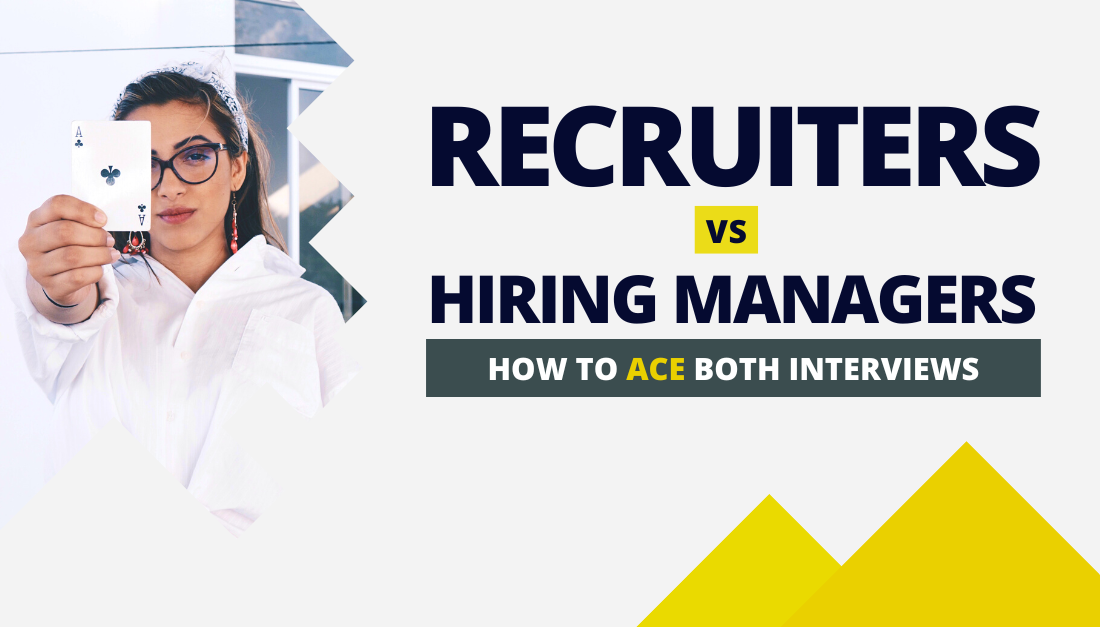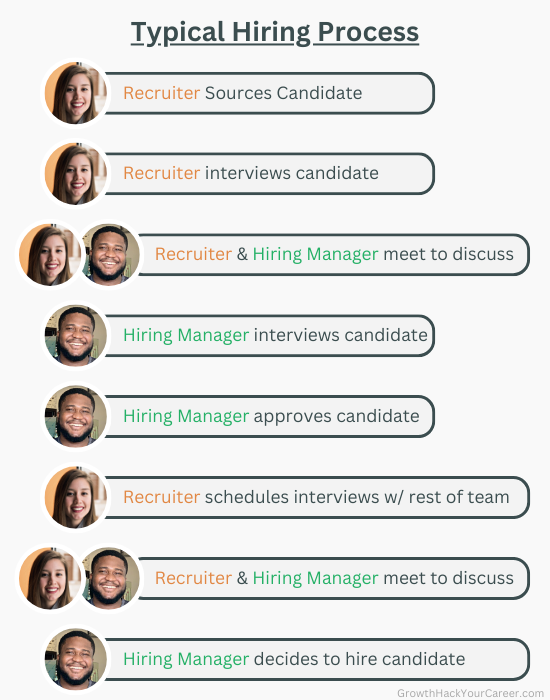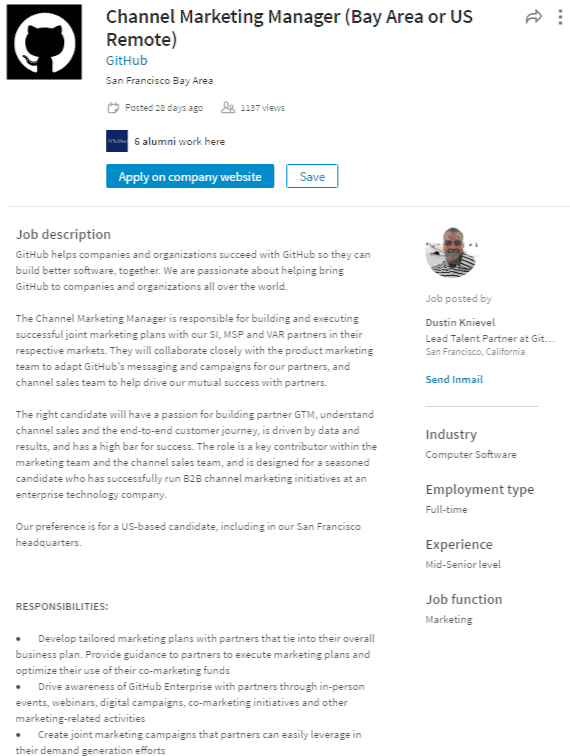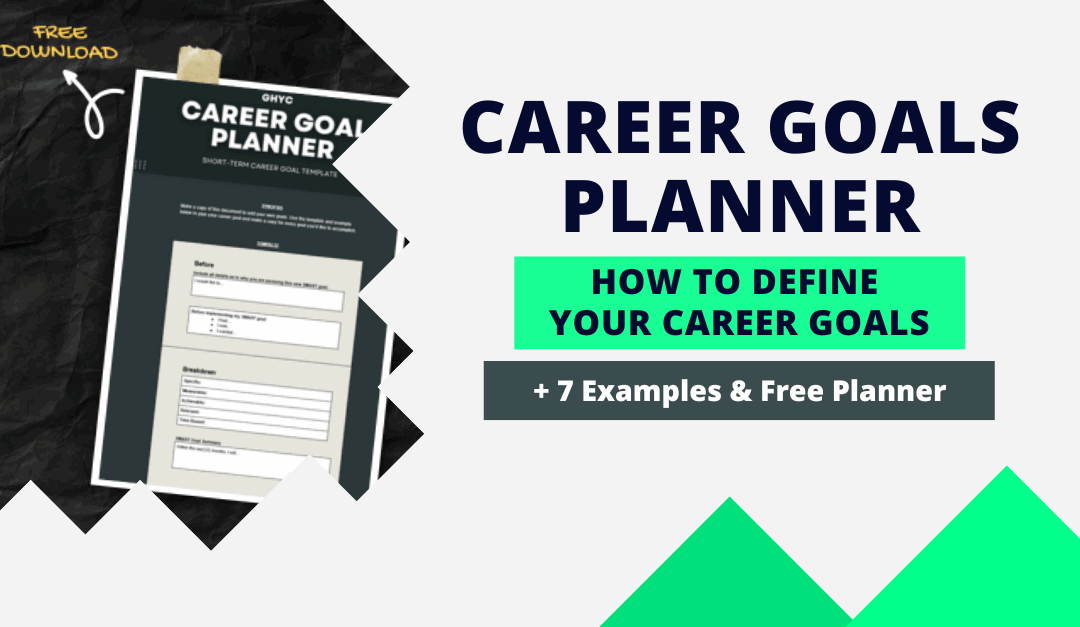
Recruiter vs Hiring Manager: 3 Big Differences and How to Master Each Interview
A lot of otherwise smart job candidates fail their interviews for one simple reason: they don’t understand the difference between a recruiter vs a hiring manager.
Even though recruiters and hiring managers work closely together, there are some key differences that are crucial to understand.
According to the latest data, a job opening will attract about 250 applicants on average. Of those 250 applicants, about 6 will get called in for interviews.
If you are one of those lucky six applicants, the last thing you’ll want to do is waste the opportunity because you mess up your interview with the recruiter or hiring manager.
Knowing what a recruiter does vs what a hiring manager does, is one of the keys to acing the interview process and getting a job offer.
In this post I’ll break down:
I’ve spoken with hundreds of recruiters over the last 6 years and in this post I’ll share their perspectives with you.
I’ll show you exactly what a recruiter does, how they think about interviews, and (most importantly) the best way to approach your interviews with them (and how this differs with the hiring manager).
Alright, let’s jump right into!
Recruiter vs Hiring Manager
The difference between a recruiter vs a hiring manager can be boiled down to 2 key responsibilities:
👉 A recruiter’s main responsibility is to manage the hiring process from beginning to end.
👉 A hiring manager’s main responsibility is to make the final hiring decision.
These two people work very closely together, but each is in charge of something a bit different.
Here’s what a typical hiring process could look like:

In the end, the hiring manager has the final say whether you get hired or not.
That being said, the recruiter can also eliminate you early on in the process if they spot red flags.
Let’s look at what both a recruiter and hiring manager actually does and how to navigate both of these people during your interviews.
What does a recruiter do?
A recruiter is a person on the company’s HR team dedicated to talent acquisition (aka helping hire people for the company).
So, what does a recruiter do exactly?
The best way to think of a recruiter is like a project manager.
They gather the people needed for the project, coordinate timelines, and keep the project on track.
Talent Acquisition Expert, Jalonni Weaver, explains what a recruiter does in the following way:
“I let job candidates know what the interview process will look like, how many people they will be meeting, how long the interviews will be for, etc.”
The main thing a recruiter does is source candidates for the role and act as the main contact between those candidates and the rest of the hiring team (including the hiring manager).
Jalonni explains:
“Most recruiters meet with their hiring managers on a weekly basis to go over updates for the role and the candidates in the pipeline. During these meetings, we talk with them to go over ALL candidates and get feedback on them.”
The most important thing to keep in mind about a recruiter is that they are on your side.
Yes, a recruiter technically works for the company. And yes, they try to screen out bad candidates.
But, if you are a good candidate, they are very excited to meet with you.
Nicole Fernandez-Valle, an experienced recruiter at Meta, explains what recruiters do best:
Recruiters want to hire you.
With every resume we screen, we hope it will be the one that makes it through the process.
Our role is to get the best candidate in the role in the shortest time frame possible, so we come to every interaction with the hope and excitement that the next application could be our person.
One of the most common mistakes I see job seekers make is that they’ll come to their interviews with a very combative attitude.
In our free interviewing course, we talk extensively about how self-destructive this can be to your interviews.
The first interview of most interview processes is called a “phone screen.” This is meant to be a casual interview with the recruiter to see if you might be a good fit.
As Nicole mentioned, a recruiter is excited to meet you at this point.
That’s why it’s best to approach this interview with enthusiasm and treat the recruiter like a partner.
How to pass the recruiter interview
Here is a short excerpt from our free job interview course that explains what you should do during the recruiter interview:
To sum up the video, the recruiter is looking for two things:
- They want to make sure you are who you say you are
- They want to make sure you meet the basic qualifications for the job
Point #2 is where a lot of job seekers get in trouble.
A lot of job seekers will try to show their qualifications from a defensive position. They’ll (mistakingly) believe that the recruiter is doubting their qualifications.
But this isn’t the case.
Remember, a recruiter doesn’t know too much about your speciality. They are recruiting for multiple roles.
So, it’s best to approach the recruiter interview as a friendly conversation where you’re sharing who you are as a person and as a professional.
As I explain in the video, the recruiter interview is also your opportunity to learn as much as you can about the company and the people you’ll be interviewing with.
How to ask for the hiring manager’s name
One of the best things you can do during the recruiter interview is to ask for the hiring manager’s name. A simple way to ask for the hiring manager’s name is with a simple question like this:
If I move forward in the process, who else will I be speaking with? Can you tell me a little bit more about what the hiring manager is like for this role?
The reason you want to get this info is because the hiring manager is the person who has the final say in whether you’ll get hired or not.
Which brings us to…
What is a hiring manager?
The term “hiring manager” can be misleading. When I first heard this term, I immediately thought that this was the manager of the hiring team at the company.
But that’s not the case.
👉 A hiring manager is simply the person who is hiring someone for their team.
This means that this person could be super experienced in hiring or this could be their first time hiring someone ever.
This also means that anyone, from any department, can become a “hiring manager.” For example, a Product Marketer who has been doing a great job in their role could be allowed to form their own team.
As soon as they are allowed to hire someone, they become a “hiring manager.”
So, what is a hiring manager and what does a hiring manager do?
A hiring manager has two primary responsibilities.
First, they are in charge of writing and/or approving the job description. (This is why some job descriptions are great and others are completely unrealistic by the way).
And secondly, the big difference between a recruiter vs hiring manager is that they are in charge of making the final hiring decision.
That’s right, the hiring manager has final say in the hiring decision, which is why it’s so important to prepare for…
The Hiring Manager Interview
The hiring manager interview is very different from the recruiter interview.
As we discussed above, your main goals for the recruiter interview are to pass the screening questions and gather intel about the company.
The hiring manager interview is different in 3 very significant ways.
Your main goals for the hiring manager interview should be to:
1. Make a personal connection
This is an often overlooked part of the manager interview, but it’s super important. If you get hired, the hiring manager will become your actual manager. That means you’ll be spending a lot of time together.
Managers, just like all people, want to work with people who are pleasant to work with. That’s why your #1 priority should be to establish rapport with the hiring manager. If you’d like some tips on how to build rapport, I recommend reading about the 7 best questions to ask at the end of an interview here.
2. Offer solutions
A hiring manager is looking to hire someone because they have a problem that they can’t solve themselves. One of the most important things that hiring managers look for in an interview is someone who has a solution mindset. This is why it’s vital to not only talk about your skills, but also showcase how you created solutions in past roles.
A great way to showcase your solution mindset is by telling interview stories. Here is a great video on how to tell interview stories by Jess Smith, an ex-recruiter who has interviewed over 1,000 candidates!
3. Describe a project
Your third goal for the hiring manager interview should be to differentiate yourself from other candidates. Remember those 6 candidates that make it to the interview process? Each of them will have similar experience and qualifications to you.
One of the best ways to stand out from the pack is by describing a project you’ve worked on. Unlike your general work experience, the projects you’ve worked on are very likely to be unique compared to other candidates. If you need help thinking of which projects to talk about, you can get some ideas from this interview prep guide.
Remember, the hiring manager interview is very different from the recruiter interview, which is also different from the other interviews you’ll face in the hiring process.
In our free interview course, we talk about all 4 stages of the interview process, but here’s a video explaining what to do during the hiring manager interview stage:
How to find the hiring manager
If you’d like to give yourself an extra edge over other candidates, one thing you can do is to find out who the hiring manager is for the role ahead of time.
This is helpful in case you’d like to network into a job or gather some information about the role before apply for it.
One of the easiest ways to find the hiring manager for a role is to look up who posted the job on LinkedIn.
One of the reasons I recommend LinkedIn as one of the best job search sites, is because it usually tells you who the job poster is.
If you go to a job opening on LinkedIn, you can see who the hiring manager is in the right column next to the job description like this:

Now, sometimes this will be the hiring manager, sometimes it will be the recruiter, and sometimes it will just be anonymous.
If the job poster is the recruiter, you can still reach out to the recruiter on LinkedIn.
This is where LinkedIn Premium is very useful for job seekers. That’s because, if you have LinkedIn Premium, it lets you send inMail (LinkedIn emails) to people on LinkedIn.
There are also other benefits of LinkedIn Premium for job seekers, such as:
- Competitive Intelligence
- Job Application Data
- InMail Credits
- LinkedIn Learning
- Profile View Alerts
I definitely recommend reading up on LinkedIn Premium if you haven’t already.
This is also a great way to find out who the hiring manager is for your cover letter.
Customizing your cover letter for the hiring manager is a great way to stand out from other job candidates. If you need a cover letter, you can get my proven cover letter template for free (plus a guide on how to fill it out).
Takeaways & Next Steps
As you can see, there are some key differences between a recruiter vs a hiring manager. The main differences to remember are:
👉 A recruiter is like a project manager. They are on your side. They want to hire you.
👉 A hiring manager has the final say on whether you get hired. They want to know about your expertise, but they also want to make a personal connection with you.
As you prepare for your interviews, remember that you should approach each of these interviews in a different way.
If you’d like to learn more about what a hiring manager looks for in an interview or how to handle the recruiter phone screen, you can learn about both in our free interview course.
Just drop your email below and I’ll send it straight to your inbox (plus a few other helpful guides we covered here today).
Hope this is helpful and feel free to reach out to me on LinkedIn if you have questions!
More from the blog

Ultimate Career Goals Planner: How to choose your career goals (+7 examples)
Ultimate Career Goals Planner: How to choose your career goals (+7 examples)A mentor of mine once...
Good Weakness for Interview: How to Craft the Perfect Answer (+10 Examples)
Good Weakness for Interview: How to Craft the Perfect Answer (+10 Examples)One of the biggest...
Top 9 Questions for Second Interviews: What to expect & how to answer
Top 9 Questions for Second Interviews: What to expect and how to answer Congratulations! 🎉 If...
Like this? Try our free courses!
Tired of sending your job applications into a black hole and never hearing back? Get hired faster with our guided courses all for FREE!
Bogdan Zlatkov is the Founder of GHYC and author of "The Ultimate Guide to Job Hunting", ranked #1 on Google. He has been featured in the Wall Street Journal, Fast Company, HR Dive, and more. At GHYC, Bogdan creates job search courses & tools by working with award-winning career coaches, best-selling authors, and Forbes-Council members. Prior to GHYC, Bogdan led the content programs at LinkedIn Learning.